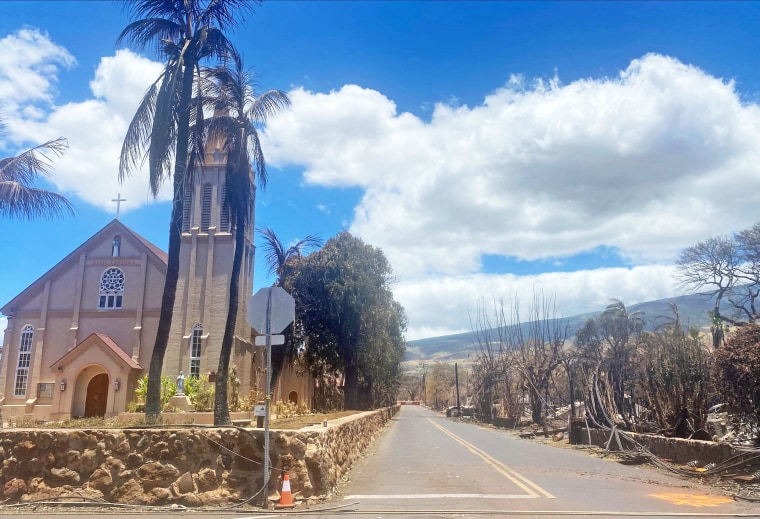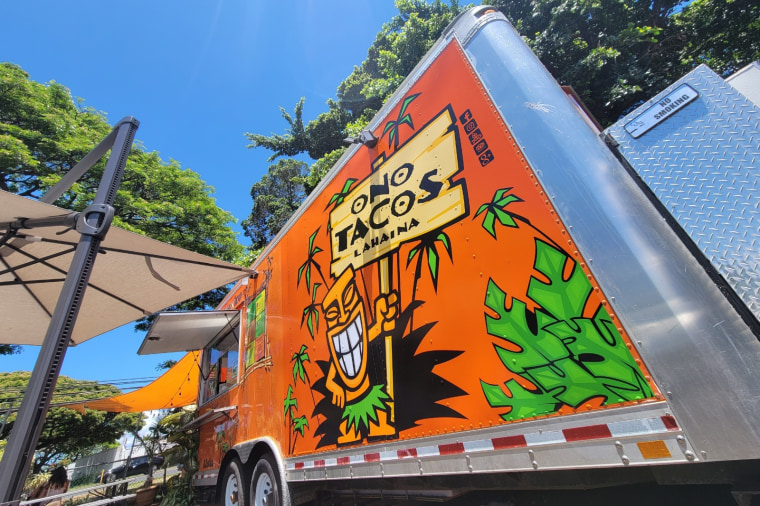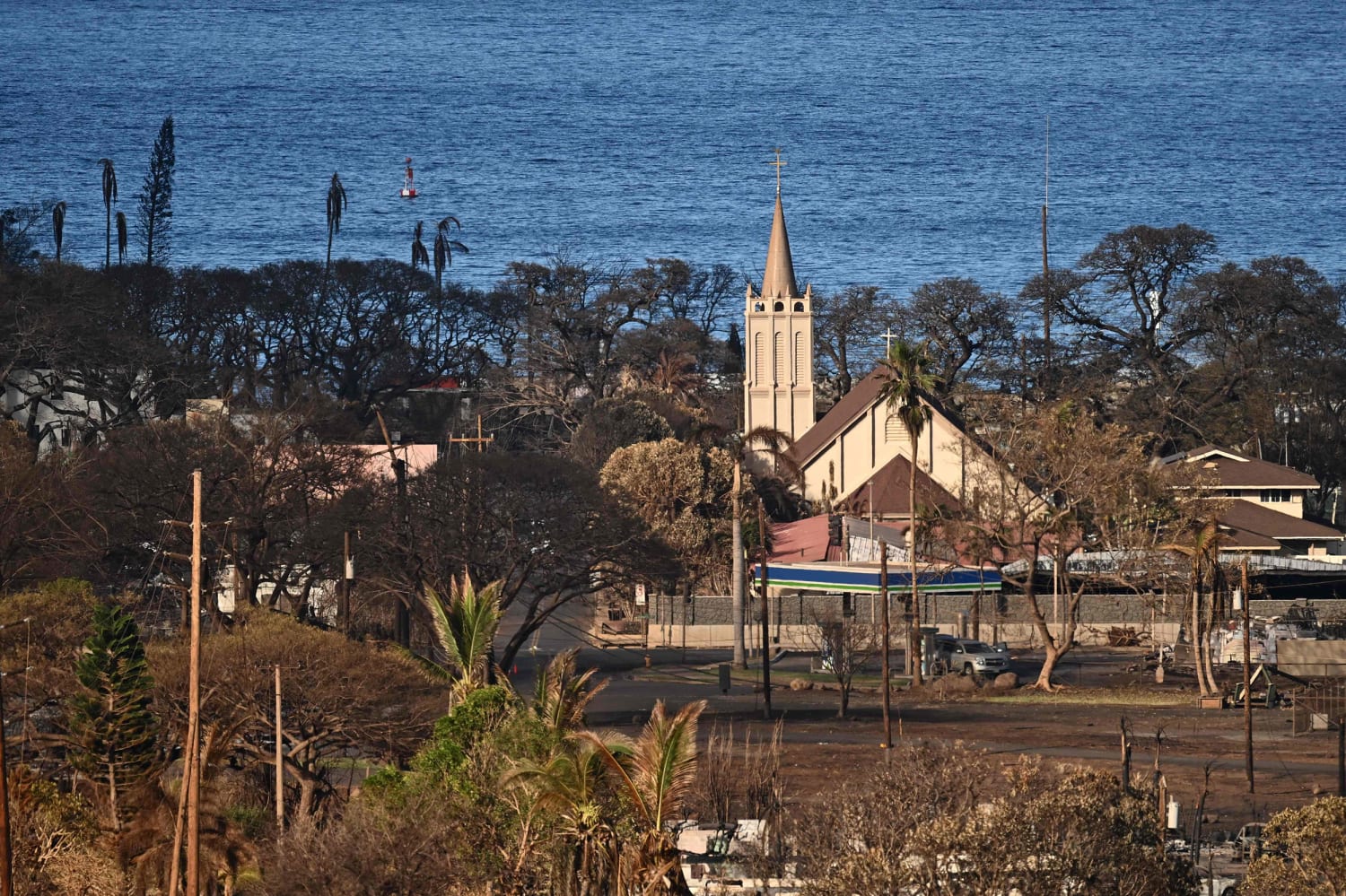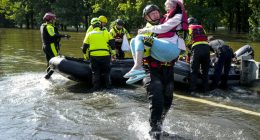Lahaina, the historic town on the island of Maui where Kimberly Romero lived, worked and sent her 5-year-old daughter to school, was already in flames when they fled this month with just minutes to spare. Mother and daughter found housing in an Airbnb. But now, Romero faces an uncertain future as her home and belongings were destroyed. Originally from Honduras, Romero moved to Lahaina a year ago and was just getting to know what she called a “homey” Latino community.
“I did see pictures of my apartment complex. … There was just nothing left there,” Romero told NBC News. “I’m a single mom. You know, we’re in that house. All the memories … it’s so heartbreaking. And I know they’re material things … but it’s very traumatic. … Your life can change from one second to the other.”
But that same Latino community on Maui, which also includes Mexicans, Salvadorans, Guatemalans and Argentinians, now faces a particularly grueling set of challenges in the fire’s wake. Lahaina’s Latino immigrants, many of whom moved to Maui to work in its bustling tourism industry, are struggling to navigate the loss of their homes, jobs and loved ones. Many are wondering if they’ll be able to stay in Maui or whether they’ll have to leave and go to other states with steadier work opportunities.
Last week, the Mexican Foreign Ministry confirmed the death of two Mexican nationals in the fires, but the exact number of Latinos who are missing, deceased or displaced as a result of the fires remains uncertain. About 1,100 people remain unaccounted for, and officials have turned to DNA testing to help identify remains, though that has made some immigrants who lack legal status fearful.
“We have DNA swabbing going around because they’re trying to identify people that are deceased with people at shelters and I had a girl ask me, ‘Am I at risk of, you know, getting deported?’” said Alejandra Ramirez, co-founder of Roots Reborn, an organization created to mobilize resources to immigrants affected by the fires.
Officials have assured people the DNA samples won’t be entered into any law enforcement databases and people wouldn’t be asked about their immigration status or citizenship. So far, 104 samples have been collected to identify the nearly 1,100 who remain missing, officials said at a news conference Tuesday.

Ramirez, who works with the University of Hawaii’s first-generation low-income immigrants, started Roots Reborn alongside Veronica Mendoza, who worked with Maui Economic Opportunity’s Enlace Hispano, a nonprofit providing a range of bilingual services to the Hispanic community. Both are daughters of Mexican immigrants.
Kevin Block, an immigration attorney based in Maui, said that the majority of clients he serves in the Deferred Action for Childhood Arrivals program — immigrants who lack legal status after having been brought to the U.S. as children — are Latinos from Lahaina. Of Maui County’s estimate of 4,500 Lahaina residents who are displaced, Block estimates that around 30% are immigrants. Many of them, he said, are Latinos from mixed immigration status families.
Following the fires, the Mexican Consulate General of San Francisco assisted approximately 200 Mexican nationals on Maui whose documents were destroyed in the fire, according to Roots Reborn and Block, who assisted in the process. The consulate did not immediately respond to a request for comment.
“It’s sad when you realize that everything you built in 20 years is gone in the blink of an eye. In just four hours, everything you built in 20 years vanished,” said Jesus Rodriguez, originally from Mexico, who lost his home in the fire.
A rich ‘paniolo’ history
Latinos’ presence in Hawaii spans centuries.
Spanish immigrants arrived in the archipelago in the late 1700s, and a booming agricultural business brought Latinos to the islands to harvest pineapple and sugarcane. In the 1800s, King Kamehameha III invited Mexican vaqueros, or cowboys, to teach locals how to manage cattle as Hawaii’s beef industry grew. As Hawaiian and Mexican cultures blended, paniolo — a derivative of “español” — ranching culture was born and remains today.
Today, Latinos make up about 11% of Hawaii’s population, according to data from the U.S. Census.
“There’s so many of us. … The men would gather at the park on Sundays to play soccer or in the churches, because we also had a Catholic church, our congregation in Spanish,” said Veronica Tellez, a food truck owner who came to Lahaina from Mexico 16 years ago.

Maria Lanakila Catholic Church, which Tellez frequented, survived the fire, but the food truck she shared with her ex-husband did not.
“FEMA said they can’t help us. They sent me to the Small Business Administration, but there it would be to get a loan,” Tellez said. Latino organizers are mobilizing to help business owners, workers and residents access FEMA aid and other support.
In the days following the fire, Mendoza jet-skied into Lahaina to provide translation services in Spanish.
Working with Mendoza, Joel “Quecho” Montoya Morquecho, a community organizer and local therapeutic masseuse, went door to door to assess the needs of affected Latinos in the areas surrounding Lahaina.
Morquecho, 53, came to Maui 23 years ago for a vacation and never left. He had been working as a radiology technician and dental assistant in California, but it became difficult to work multiple jobs.
“My heart is in Maui… I’d like to stay in Maui…with a job that covers my expenses… so I can live here and serve,” he said.
Morquecho applied for FEMA aid but doesn’t know if he qualifies yet. He is also waiting on a pending petition for status that his daughter filed for him in 2021. His house was spared in the fire, but all of his work equipment was destroyed.
“They gave me my working permit…but where will I work?” Morquecho said. “I’ll have to start again but I wonder, who is going to have enough money to pay for a massage?”
Some immigrants, including undocumented immigrants who have children with legal status, may qualify for FEMA aid, which is part of Homeland Security, according to Block. But which immigrants are eligible, including DACA recipients, is “nuanced.”
“Immigrants are not eligible for a lot of different things,” Block said. “They’re really reluctant to apply for anything because they don’t want to take any kind of public benefit or government help, even if they’re eligible for it because they’re afraid that it will influence their future ability if they’re on a pathway to lawful permanent residence or citizenship.”
After the fires, Morquecho has been providing massages for free to those who need them and volunteering for the Red Cross from 6 a.m. sometimes until midnight.
The lack of tourists for the foreseeable future has left Morquecho and other Latinos considering leaving the state altogether. He may go back to California or to Columbus, Ohio, where he said he has a community.
Morquecho had also started his own cleaning business in Lahaina, which is now also gone.
“Well now who are we going to clean for? Nobody. There is no tourism,” Morquecho said.
Jesus Rodriguez, originally from Mexico, had been working at Amigos Lahaina restaurant on Front Street before the fire. The restaurant and the house he was renting were both destroyed, and he’s now staying at his brother-in-law’s house while he figures out his next move.
Rodriguez, who has three kids, is considering returning to Michigan, where he moved from 16 years ago. But his 9-year-old tells him that this is where he was raised and where he has his memories.
“We also need tourists to come, too, because it’s only one side of the island that is shut down,” Romero, who worked at Maui Tacos, said. “There’s no tourists. There’s no revenue. People are closing down the restaurants because you know, people are not coming and we need business.”
Jose “Pepe” Vega, who runs operations for Maui Tacos, said that business is down at the restaurant’s two other locations due to a lack of visitors.
In the meantime, Lahaina’s Maui Tacos location survived the fires and is acting as a hub for feeding first responders and others in need.
The aftermath of the fire has shocked Vega.
“It touches me, it makes me cry, but I believe we have to continue,” Vega said, “for the well-being of the island and all of the people here.”
Source: | This article originally belongs to Nbcnews.com









